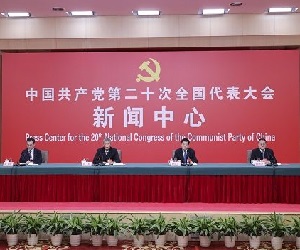 The fight against corruption and the guarantee of food and energy security are points of the highest priority for the Communist Party (PCCh) of this Asian nation, confirmed representatives of various departments of the aforementioned political organization whose XX National Congress began to meet in plenary from this October 16.
The fight against corruption and the guarantee of food and energy security are points of the highest priority for the Communist Party (PCCh) of this Asian nation, confirmed representatives of various departments of the aforementioned political organization whose XX National Congress began to meet in plenary from this October 16.
Curbing corruption and bureaucracy has been at the center of the CCP’s attention, protecting it from misconduct and interference by powerful forces of power, said Xiao Pei, deputy head of the Central Commission for Discipline Inspection of the Central Committee. of the CCP.
“We have zero tolerance for it,” he said. That combat, he insisted, has not distinguished ranks or positions, since among those investigated include members of the Central Committee itself and of the Disciplinary Commission. “We reach the levels that are necessary,” he said.
In the last decade, he detailed, they aired 650,000 processes for corruption or inappropriate work behavior related to education and medical care, pensions, social security, law enforcement, among others linked to services or means of subsistence. of citizenship.
In that same period, he explained, more than 74,000 people were sanctioned for these charges, of which 48% had perpetrated their misdeeds before 2012 and only 11% after 2017. “Which shows that not to falter in this effort It has been effective,” he said.
Surveys cited by the also vice president of the National Supervisory Commission indicate that more than half of the Chinese population considers the efforts and results of the Party in its fight against corruption to be adequate. However, he clarified, it is an unfinished road; and in which “he will not make setbacks or rest”, he sentenced.
In the central report to the 20th Congress, the CCP pointed out that 10 years ago, in contrast to the successes of the Reform and Opening-up, there were four habits within it that it described as “unhealthy”: formalism, bureaucracy, hedonism, and proclivity to waste and waste. the lavishness. However, its secretary general Xi Jinping stressed that the group of measures taken from then to date reversed a scenario that he believed put the future of the country at risk.
Also on Monday, Cong Liang, director of the State Administration of Grains and Reserves, said that “China has ensured that the food supply is firmly in its own hands.” The national production of grains, he indicated, has always exceeded 650 million tons annually since 2015.
Last year, he added, said production climbed to 682.85 million tons. All this, he emphasized, proves the ability of the Asian nation to guarantee its food security; especially for its grain storage capacity that exceeds 700 million tons; and for the 6,000 companies here that are capable of responding to emergency situations in this regard.
Similarly, other CPC Central Committee representatives reiterated that the country is determined to have a secure and resilient energy system. An issue that, they stressed, is also a priority for the Party.
Beijing, they said, will continue to take the necessary steps to expand the role of domestic sources within its energy matrix, both fossil fuels and renewable sources, in addition to nuclear power.
Achieving the goal of carbon neutrality by mid-century is a key objective within the domestic sustainable development strategy. It is an issue of energy security, they commented, for this reason, they concluded, China is clear in its aspiration to reduce the carbon footprint within its economic growth.
Both the fight against corruption and the path that China will adopt in the coming years in terms of the economy and energy are issues that will be examined in the plenary session of the 20th National Congress of its Communist Party, which should conclude on October 22.